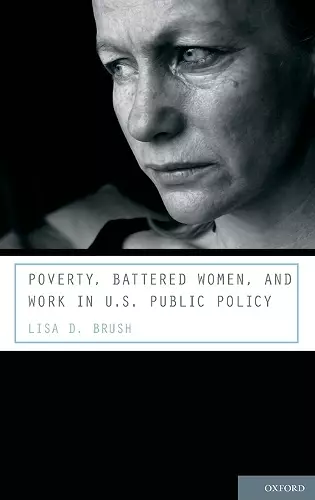Poverty, Battered Women, and Work in U.S. Public Policy
Format:Hardback
Publisher:Oxford University Press Inc
Published:25th Aug '11
Currently unavailable, and unfortunately no date known when it will be back

Drawing on longitudinal interviews, government records, and personal narratives, feminist sociologist Lisa Brush examines the intersection of work, welfare, and battering. Brush contrasts conventional wisdom with illuminating analyses of social change and social structures, highlighting how race and class shape women's experiences with poverty and abuse and how "domestic" violence moves out of the home and follows women to work. Brush's unique interview data on work-related control, abuse, and sabotage, together with administrative data on earnings, welfare, and restraining orders, offer new empirical insights on the impact of work requirements and other post-welfare rescission changes on the lives of low-income and battered mothers. Personal narratives provide first-hand accounts of women's perceptions of the broad forces that shape the circumstances of their everyday lives, their health, their prospects, their ambitions, and their diagnoses of their world. Deftly integrating the political and the personal, the administrative and the narrative, the economic and the emotional, Brush underscores the vital need to reexamine ideas, policies, and practices meant to keep women safe and economically productive that instead trap women in poverty and abuse. With her fresh approach to problems people often see as intractable, Brush offers a new way of calculating the costs of battering for the policy makers and practitioners concerned with the well being of poor, battered women and their families and communities.
"Brush smartly challenges the everyday beliefs about women's relationship to work, battering, personal responsibility, and self-empowerment that are so embedded in public policy and individual consciousness that they appear natural and normal rather than punitive, dangerous, and wrong. At the very time that public policy uses work requirements to burden or bar women from all too many welfare state programs, Brush contests the meaning of work as route out of poverty and as an escape from abusers without denying the importance of work in the lives of women. A feminist structural analysis, this important text powerfully exposes the overlapping logics that endorse battering and poverty, promotes a human rights agenda, and gives voice and visibility to the women the book sets out to appreciate and serve." --Mimi Abramovitz, Bertha Capen Reynolds Professor of Social Policy, Hunter College School of Social Work and The Graduate Center, City University of New York "In this heartbreaking but essential book, Lisa Brush provides new insight into the surprisingly vicious circle battering produces in the lives of poor women. While U.S. social policy assumes that paid work offers a route out of poverty and abuse by reducing women's dependency, this book shows how abuse trails women out of the home, disrupts their efforts to hold jobs, and churns them in and out of abusive relationships. Using moving personal accounts and compelling statistical data, the book makes clear just how tightly poverty, employment, and battering are linked and how brutally women's options are controlled by violent men, inflexible jobs, and an unmerciful state." --Myra Marx Ferree, PhD, Martindale-Bascom Professor of Sociology and Director of the Center for German and European Studies, University of Wisconsin "To say that big things can come in small packages is to greatly underestimate the important information and wisdom contained in this text, much of it drawn from battered women on welfare. By bringing the voices of her subjects to the fore and setting them in the real world of economic hardship and disability, Brush's research gives new meaning to 'walking in the shoes' of those who have suffered coercive control and survived. The book is a must for anyone hoping to understand the interlocking trajectories of poverty, gender, welfare, work, and abuse and how far our public policies must go to realize the ideals of social justice." -- Evan Stark, PhD, Professor and Director of Public Health, School of Public Affairs and Administration, Rutgers University-Newark and Chair, Department of Urban Health, UMDNJ-School of Public Health "Most certainly, this book will be an important resource for scholars interested in the perplexing problems of relationships between abuse and poverty and how the organization of U.S. welfare policy influences women's ability to escape both... This is an example of carefully done and precisely written scholarship. I predict it will win well-deserved honors." --Contemporary Sociology "[A] valuable new boo[k] [which] help[s] us to understand how and why we have moved, over the past 75 years, from a national consensus that government should care for the poorest and most vulnerable American families to today's view that investigating so-called welfare fraud is more urgent than feeding, housing, and providing medical care for poor children." --Women's Review of Books
ISBN: 9780195398502
Dimensions: 157mm x 236mm x 23mm
Weight: 417g
208 pages